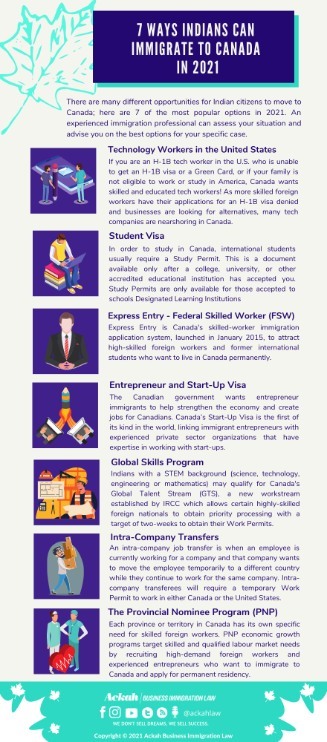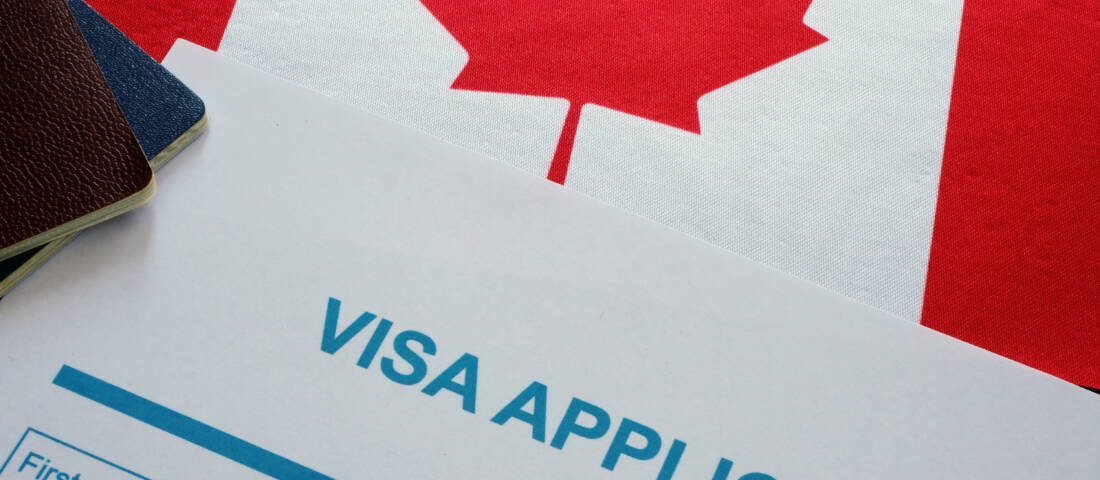Indian nationals have the highest success rate when applying for Canadian immigration compared to any other country. The number of Indians becoming Permanent Residents in Canada more than doubled from 2016 to 2020. Many young, educated Indian tech workers continue to choose Canada as an alternative to the United States due to the difficulty of getting a U.S. H-1B visa and other employment-based immigrant visas.
- Many U.S. and Indian technology companies have opened offices in Canada.
- Indian students on a study permit are attending Canadian universities in record numbers.
- Canada's points-based Express Entry favours young, English-speaking, highly educated workers.
- International students in Canada have a path to permanent residence.
- The Canadian government’s Global Skills Strategy approves many applications for high-skilled workers within two weeks.
Watch: Are You A Professional From India Who Wants To Move to Canada?
7 Ways Indians Can Immigrate to Canada in 2021
There are many different opportunities for Indian citizens to move to Canada; here are 7 of the most popular options in 2021. An experienced immigration professional can assess your situation and advise you on the best options for your specific case.

1. Technology Workers in the United States
If you are an H-1B tech worker in the U.S. who is unable to get an H-1B visa or a Green Card, or if your family is not eligible to work or study in America, Canada wants skilled and educated tech workers! As more skilled foreign workers have their applications for an H-1B visa denied and businesses are looking for alternatives, many tech companies are nearshoring in Canada.
Many foreign nationals are giving up on moving to the U.S. due to the stress and cost of the H-1B visa process. The pressure and uncertainty of re-applying for their temporary work visa, plus the years-long backlog for U.S. green card applicants, are leaving many skilled workers already in the U.S. in limbo.
2. Student Visa
Canada wants Indian graduate students! In order to study in Canada, international students usually require a Study Permit. This is a document available only after a college, university, or other accredited educational institution has accepted you. Study Permits are only available for those accepted to schools Designated Learning Institutions.
3. Express Entry - Federal Skilled Worker (FSW)
Express Entry is Canada's skilled-worker immigration application system, launched in January 2015, to attract high-skilled foreign workers and former international students who want to live in Canada permanently.
Are You Qualifed to Move to Canada?
Try Our Free Express Entry Calculator
4. Open A Business - Entrepreneur and Start-Up Visa
The Canadian government wants entrepreneur immigrants to help strengthen the economy and create jobs for Canadians. Canada’s Start-Up Visa is the first of its kind in the world, linking immigrant entrepreneurs with experienced private sector organizations that have expertise in working with start-ups.
You do not need to be a Canadian resident to open a business in Canada. If you are a business owner but not a resident of Canada and want to open a location in Canada, there are two main ways for existing foreign businesses to register to operate in Canada:
1. Open A Branch Office
To open a branch office a foreign corporation must apply as an extra-provincial or foreign corporation in each province in which the business intends to operate.
2. Incorporate a Subsidiary
A subsidiary is a Canadian corporation whose shares are held by a foreign parent company. A subsidiary can be incorporated federally or provincially. Compared to a branch office, incorporating a subsidiary gives the parent company limited liability from the actions of the subsidiary.
5. Global Skills Program
Indians with a STEM background (science, technology, engineering or mathematics) may qualify for Canada's Global Talent Stream (GTS), a new workstream established by IRCC which allows certain highly-skilled foreign nationals to obtain priority processing with a target of two-weeks to obtain their Work Permits. GTS allows employers to submit a Labour Market Impact Assessment (LMIA) to prove they were unable to recruit a Canadian employee.
6. Intra-Company Transfers
An intra-company job transfer is when an employee is currently working for a company and that company wants to move the employee temporarily to a different country while they continue to work for the same company. Intra-company transferees will require a temporary Work Permit to work in either Canada or the United States.
If their U.S. employer has a Canada location or office, United States H-1B visa holders may qualify for an intra-company transfer to Canada. H-1B visa holders and employers who an intra-company transfer to Canada must meet IRCC qualifications for an intra-company transfer.
7. The Provincial Nominee Program (PNP)
Each province or territory in Canada has its own specific need for skilled foreign workers, and immigration opportunities and procedures. PNP economic growth programs target skilled and qualified labour market needs by recruiting high-demand foreign workers and experienced entrepreneurs who want to immigrate to Canada and apply for permanent residency.
Learn More:
- How Indian Tech Workers Can Move From the United States to Canada
- Indian Migration to Canada Up 50%
- How Indian Tech Workers and Small Business Owners Can Immigrate from the U.S. to Canada
Are You An Indian Citizen Who Wants To Move To Canada?
At Ackah Business Immigration Law, our goal is to make Crossing Borders Seamlessly a reality and to smooth your way to new opportunities in Canada.
Evelyn L. Ackah is the Founder and Managing Lawyer at Ackah Business Immigration Law and has exclusively practiced immigration law for over 20 years. Ackah Law is headquartered in Calgary with offices in Vancouver and Toronto. Contact Ackah Law today at (403) 452‑9515 or email us directly at contact@ackahlaw.com.








